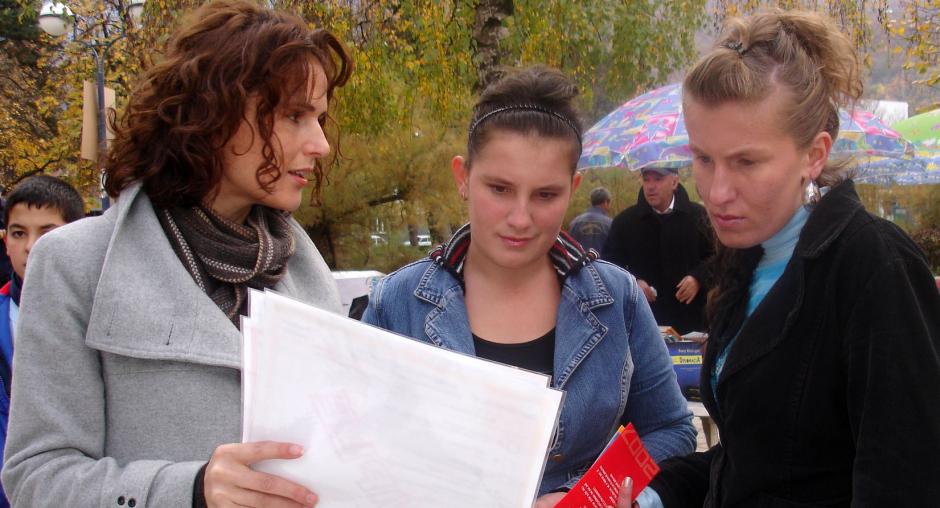OSCE Mission helps Kosovo reach out to voters ahead of weekend elections
Voting can be complicated, and on 17 November in Kosovo it will be especially so. Not only is the open list system (allowing voting for specific candidates instead of just for a party) being introduced for the first time, but there will be three types of elections on the same day: mayoral, municipal and elections for the Assembly of Kosovo.
The Central Election Commission (CEC) and its Secretariat (CECS) are in charge of organising this year's elections, having fully taken over this responsibility from the OSCE Mission in Kosovo.
They are conducting a comprehensive information campaign using TV, radio and newspaper adverts, billboards, posters and leaflets to inform citizens about the voting procedure and encourage them to vote.
However, there are still remote rural areas in Kosovo without TV coverage and with low media penetration, as well as groups of people - ethnic minorities and women - who have traditionally shown a lower level of interest in voting.
To help the CEC reach out effectively to these groups, explain voting procedures and motivate them to vote, the OSCE Mission - which has organised four previous elections in Kosovo - organized visits to rural areas, as well as additional TV programmes, to spread the CEC's message.
Reaching out to rural voters
"We have developed a voter education project which aims at reaching out to inhabitants of rural areas and explaining to them, face to face, the importance of elections and the voting procedure," said Liane Adler, Senior Human Dimension Officer with the Mission.
A bus with Mission and specially contracted staff has been visiting market places throughout Kosovo every day for ten days before the elections. The team met citizens, distributed CEC leaflets on how to vote, and explained the process in detail.
In addition, information sessions were organised in cultural centres and other public facilities throughout villages, and seven mobile SUV teams drove around and stopped at grocery stores to educate voters.
These efforts resulted in reaching out to some 1,300 voters per day.
"As a result of the field visits and direct contact between the teams and the potential voters, I believe there is an improvement in public awareness of the elections in general and the voting procedure in particular," said CEC spokesperson Arianit Osmani.
Bajram Hoti, a citizen from Peje/Pec, said that the voting procedure seemed complicated at first, but it turned out not to be that difficult. "It's all clear now," he said after talking to the OSCE team.
Encouraging women and minorities to participate
While the voter education project targeted rural inhabitants, another Mission project - "Why vote?" - focused on increasing the participation of ethnic groups such as Roma, Ashkali, Egyptians, Turkish, Bosniaks, Gorani, and Serbian potential voters, with a particular focus on women.
"We expect that once women and men from these targeted communities know more about the election system and the importance of having their interests represented, they will be more motivated to take part in the elections," said Violeta Selimi, Mission Project Co-ordinator in charge of this project.
The "Why vote?" project also included TV shows on TV21, a Kosovo-wide TV station, featuring women candidates and minority NGOs, Roma, Turks, Serbs and Bosniaks, who spoke about the importance of voting and information sessions, where they focused on the reasons to vote.
And while the campaigns of political parties were in full swing and pictures of candidates occupied almost every billboard in Kosovo's towns, the Mission gave the Balkan Investigative Reporting Network (a regional media development organization that also produces news and programmes) financial support to produce 30 municipal debates with mayoral candidates. Only candidates from three northern municipalities with majority Kosovo Serb populations refused the offer.
Nationwide TV and radio debates
The debates were broadcast on local TV and radio as well as on RTK, Kosovo's public TV channel. The aim was to offer citizens a chance to hear the candidates' plans for their municipalities and ask them tough questions.
"I think it's a great opportunity that citizens of respective municipalities can see and hear what their candidates offer to them, so they can really think before they cast their vote," said one citizen from Prishtine/Pristina, who declined to be identified.
"These debates showed us that many candidates for mayor don't have answers to the simplest questions and when they do, they can be quite funny. We did not have the chance to see the candidates for previous elections, but this time, fortunately, we do."
CEC spokesperson Osmani is optimistic about the coming vote: "We hope these joint efforts by the CEC and the OSCE will result in a big turnout of voters on election day as well as quick and effective voting," he said.
But after the elections, Kosovo will soon go back to "normal", dealing with basic day-to-day issues like regular water and electricity supplies and unemployment. The question of who will deal with these problems remains to be seen.

